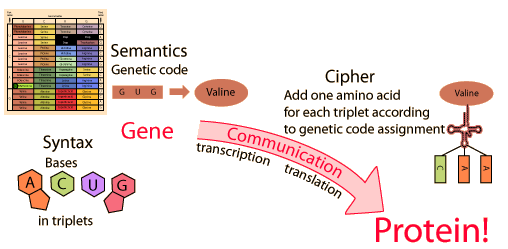Chance and necessity can't build a code
A powerful case can be made that such a formal code process only arises from intelligence.

"Formal algorithmic prescriptive information (PI) is the key to any successful computer program, including the programs within life. ... PI involves formal choices at decision points that cannot be generated by randomness or law(necessity)." Johnson, Programming of Life, p39
"Biological information is not a substance ... biological information is not identical to genes or to DNA (any more than the words on this page are identical to the printers ink visible to the eye of the reader). Information, whether biological or cultural, is not a part of the world of substance." Hoffmeyer and Emmeche, 2005
"For prescription to be realized, the destination of any message must have knowledge of the source's alphabet, rules and cipher. The destination must also possess the ability to use the cipher. ... But when it comes to life's syntax, semantics and pragmatics, we fanatically insist for metaphysical reasons that the system is purely physical. No empirical, rational, or prediction-fulfillment support exists for this dogma." David Abel, Semiotica, Jan 2009.
| The optimization of the genetic code |
| The one-way code |
| Outline |
References

